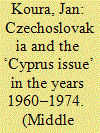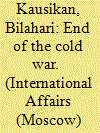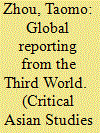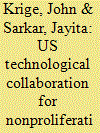|
|
|
Sort Order |
|
|
|
Items / Page
|
|
|
|
|
|
|
| Srl | Item |
| 1 |
ID:
183369


|
|
|
|
|
| Summary/Abstract |
This study is based on a broad range of newly declassified documents which garner revelatory findings pertaining to the involvement of Czechoslovakia in the Cyprus dispute in the years 1960–1974. These new findings reveal that the countries of the Eastern Bloc sought to prevent the overthrow of the Cypriot President Makarios during the studied period, as his foreign policy ensured that the island would not become a NATO base against allied Arab countries in the Middle East. Czechoslovakia played a considerable role in keeping Makarios in power by arms deliveries (some of them hitherto unknown), which allowed him to build up the special police forces to counterweight the National Guard controlled by Greece and face attempts of the Greek junta to overthrow him. Additionally, this article analyses activities of Czechoslovak intelligence on the island which managed to obtain valuable information on the politically unstable Eastern Mediterranean and Middle East from the inner circle of President Makarios. Czechoslovak intelligence, contrary to the Ministry of Foreign Affairs, backed weapon sales to Cyprus and supported the island’s non-alignment policy because these guaranteed a steady supply of valuable intelligence on the entire Middle East.
|
|
|
|
|
|
|
|
|
|
|
|
|
|
|
|
| 2 |
ID:
146279


|
|
|
|
|
| Summary/Abstract |
THERE IS A STORY, possibly apocryphal, that while briefing Richard Nixon for his 1972 visit to China, Henry Kissinger told the President that Zhou Enlai was an avid student of French history. During his trip, Nixon met Zhou in the Forbidden City. As they strolled together through the gardens, Nixon remembered Kissinger's comment and asked Zhou what he thought had been the influence of the French Revolution on western civilization. Zhou paused for thought, then replied: "Too early to tell." Similarly it could well be too early to tell what the end of the Cold War means for the international system. But at least the broad outlines of some of the main issues may now be glimpsed.
|
|
|
|
|
|
|
|
|
|
|
|
|
|
|
|
| 3 |
ID:
164681


|
|
|
|
|
| Summary/Abstract |
Originating from the 1955 Bandung Conference, the Afro-Asian Journalists’ Association (AAJA) promoted international collaboration among journalists in newly independent countries. Built on an inclusive foundation of peaceful co-existence, the AAJA contributed to the development of expansive global information networks, lively intellectual traffic, and rich visual arts among Afro-Asian nations. However, the cosmopolitanism of its early years was later undermined by the decline of constitutional democracy in Indonesia and a lack of cohesion among Afro-Asian nations. After the September Thirtieth Movement in Indonesia in 1965, the AAJA relocated to Beijing and was mobilized by the Chinese state to promote the P.R.C. as the leader of an embittered Third World’s battle against American imperialism and Soviet revisionism. In the early 1970s, ideological fervor began abating in China. During this time, Mao’s reframing of the three worlds, which was based on developmental measurements, redirected the AAJA’s Third World discourse to issues of modernization until its quiet dissolution in 1974. The history of the AAJA demonstrates the complex and often conflicted ways in which two important post-colonial states – Indonesia and China – conceptualized “the Third World” and formulated media representations during the Cold War.
|
|
|
|
|
|
|
|
|
|
|
|
|
|
|
|
| 4 |
ID:
151627


|
|
|
|
|
| Summary/Abstract |
This article aims to deepen scholarly understanding of the special political and economic connection between Britain and Socialist China during the 1950s and the 1960s. After 1949, the British government had substantive reasons to preserve a link with Beijing, despite the unfolding of the Cold War. First, British assets in China were numerous. Second, the Crown colony of Hong Kong was an indispensable strategic enclave, although militarily indefensible. Third, the Foreign Office considered that Asia should represent an exception to unquestioned British loyalty to the Atlantic alliance, since the United Kingdom needed to prove that it was able to represent and preserve Commonwealth interests in the area. The article will point out that the United Kingdom maintained a privileged role as the main trading partner of the People's Republic of China (PRC) outside the Socialist bloc, thanks to the financial and commercial role played by Hong Kong. This is proved through an analysis of the fate of British financial institutions in China, which represented a favourable exception in the bleak scenario of the PRC nationalization process, as well as of the industrial development of the British colony, which was based on importing food and labour from the mainland, while serving as a financial hub in support of the PRC economy.
|
|
|
|
|
|
|
|
|
|
|
|
|
|
|
|
| 5 |
ID:
162682


|
|
|
|
|
| Summary/Abstract |
Although the existing international-relations scholarship argues that technological assistance in the nuclear domain increases the probability of nuclear proliferation, the historical account indicates otherwise. Congressional legislation for nonproliferation, economic sanctions, and poor state capacity—specifically, inept managerial capabilities of the recipient state—explain merely part of the puzzle, but overlook the role of positive inducements offered to impede nuclear proliferation. Historical evidence shows that the United States often provided technological assistance with the deliberate intent to inhibit proliferation. In other words, Washington employed its technological leverage to attain nonproliferation goals. American technological preponderance since the end of World War II made such an approach feasible. This study examines key Cold War cases—Israel/Egypt, India, and West Germany—where the United States offered technological assistance with the deliberate intent to stall nuclear proliferation, thereby underscoring the role of assistance for inhibitive ends.
|
|
|
|
|
|
|
|
|
|
|
|
|
|
|
|
|
|
|
|
|